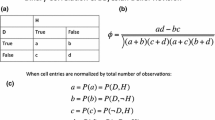Abstract
This paper shows how complex argumentation, analyzed as dialectical structures, can be evaluated within a Bayesian framework by interpreting them as coherence constraints on subjective degrees of belief. A dialectical structure is a set of arguments (premiss-conclusion structure) among which support- and attack-relations hold. This approach addresses the observation that some theses in a debate can be better justified than others and thus fixes a shortcoming of a theory of defeasible reasoning which applies the bivalence principle to argument evaluations by assigning them the status of being either defeated or undefeated. Evaluation procedures which are based on the principle of bivalence can, however, be embedded as a special case within the Bayesian framework. The approach developed in this paper rests on the assumptions that arguments can be reconstructed as deductively valid and that complex argumentation can be reconstructed such that premisses of arguments with equivalent conclusions are pairwise independent.
Similar content being viewed by others
References
Adams E.W. (1996). 4 Probability-preserving properties of inferences. Journal of Philosophical Logic 25(1):1–24
Bamber D., Goodman I.R., Nguyen H.T. (2001). Extension of the concept of propositional deduction from classical logic to probability: An overview of probability-selection approaches. Information Sciences 131(1–4):195–250
Betz G. (2005). The vicious circle theorem—a graph-theoretical analysis of dialectical structures. Argumentation 19(1):53–64
Betz, G. (2007). Evaluating dialectical structures. http://www.userpage.fu-berlin.de/~ggbetz/ev_biv.pdf.
Bondarenko A., Dung P.M., Kowalski R.A., Toni F. (1997). An abstract, argumentation-theoretic approach to default reasoning. Artificial Intelligence 93(1–2):63–101
Cayrol, C., & Lagasquie-Schiex, M.-C. (2005). On the acceptability of arguments in bipolar argumentation frameworks. In L. Godo (Ed.), Symbolic and quantitative approaches to reasoning with uncertainty, 8th European Conference, ECSQARU 2005, Lecture Notes in Computer Science (Vol. 3571, pp. 378–389). Springer.
Chesñevar C.I., Maguitman A.G., Loui R.P. (2000). Logical models of argument. ACM Computing Surveys 32(4):337–383
Dung P.M. (1995). On the acceptability of arguments and its fundamental role in nonmonotonic reasoning, logic programming and n-person games. Artificial Intelligence 77(2):321–358
Ellsberg D. (1961). Risk, ambiguity, and the savage axioms. Quarterly Journal of Economics 75(4):643–669
Haenni, R., Kohlas, J., & Lehmann, N. (2000). Probabilistic argumentation systems. In J. Kohlas & S. Moral (Eds.), Handbook of defeasible reasoning and uncertainty management systems. Algorithms for Uncertainty and Defeasible Argumentation (Vol. 5). Kluwer.
Haenni R., Lehmann N. (2003). Probabilistic argumentation systems: A new perspective on the Dempster–Shafer theory. International Journal of Intelligent Systems 18(1):93–106
Kohlas J. (2003). Probabilistic argumentation systems: A new way to combine logic with probability. Journal of Applied Logic 1(3–4):225–253
Krengel, U. (2003). Einführung in die Wahrscheinlichkeitstheorie und Statistik. Vieweg.
Laskay K.B., Lehner P.E. (1989). Assumptions, beliefs and probabilities. Artificial Intelligence 41(1):65–77
Levi, I. (1980). The enterprise of knowledge. An essay on knowledge, credal probability and chance. MIT Press.
Lin, F., & Shoham, Y. (1989). Argument systems: A uniform basis for nonmonotonic reasoning. In R. J. Brachman, H. J. Levesque, & R. Reiter (Eds.), Proceedings of the 1st International Conference on Principles of Knowledge Representation and Reasoning (pp. 245–255). Morgan Kaufmann.
Novak, V., Perfilieva, I., & Mockor, J. (1999). Mathematical principles of fuzzy logic. Kluwer.
Pollock J.L. (1970). The structure of epistemic justification. American Philosophical Quarterly 4:62–78
Pollock J.L. (1987). Defeasible reasoning. Cognitive Science 11(4):481–518
Pollock, J. L. (1995). Cognitive carpentry. A blueprint for how to build a person. MIT Press.
Pollock J.L. (2001). Defeasible reasoning with variable degrees of justification. Artificial Intelligence 133(1–2):233–282
Prakken, H., & Vreeswijk, G. (2001). Logics for defeasible argumentation. In D. Gabbay & F. Guenthner (Eds.), Handbook of philosophical logic (Vol. 4, 2 ed., pp. 219–318). Kluwer.
Rescher, N. (1969). Many-valued logic. McGraw-Hill.
Shafer, G. (1976). The mathematical theory of evidence. Princeton University Press.
Shafer G. (1990). Perspectives on the theory and practice of belief functions. International Journal on Approximate Reasoning 4:323–362
Tetens, H. (2004). Philosophisches Argumentieren. Beck.
Verheij, B. (1996). Rules, reasons, arguments. Formal studies of argumentation and defeat. Dissertation, Universiteit Maastricht.
Vreeswijk G.A.W. (1997). Abstract argumentation systems. Artificial Intelligence 90(1–2):225–279
Author information
Authors and Affiliations
Corresponding author
Rights and permissions
About this article
Cite this article
Betz, G. Evaluating dialectical structures with Bayesian methods. Synthese 163, 25–44 (2008). https://doi.org/10.1007/s11229-007-9276-4
Received:
Accepted:
Published:
Issue Date:
DOI: https://doi.org/10.1007/s11229-007-9276-4




